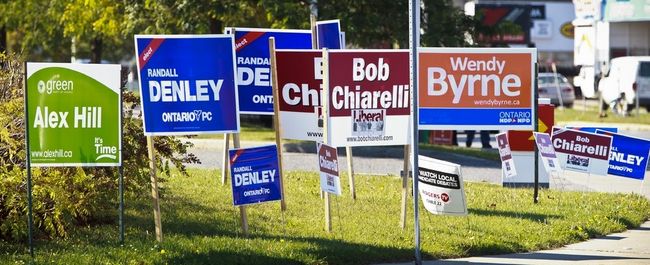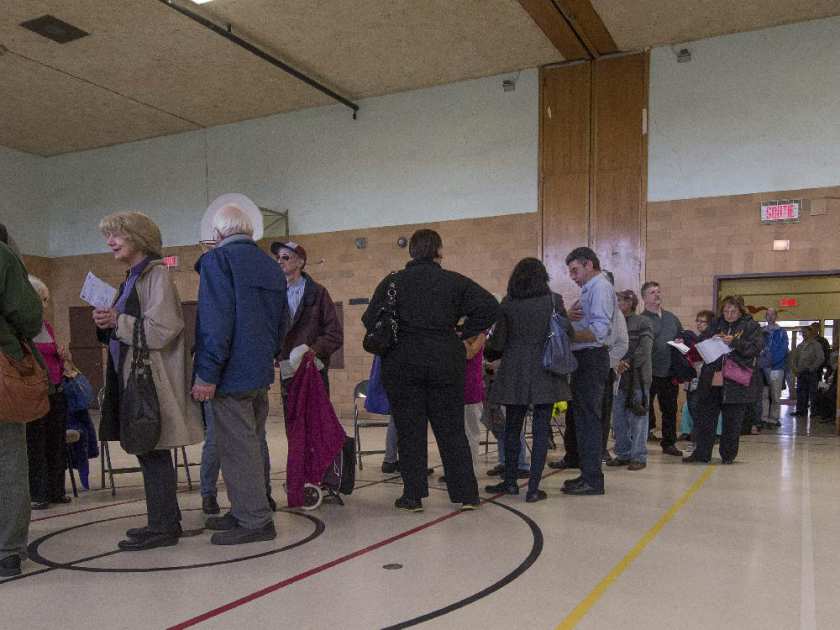Burlington’s Member of Parliament Karina Gould will be leading a public consultation on Electoral Reform at the Mainway Recreation centre in the auditorium on Saturday September 10th at 12:30.
She wants to hear what her community has to say about the changes Justin Trudeau promised to deliver in the way of electoral reform. The Gazette is publishing a three part series on what the election reform options are.
This is the first of the three parts.
 By Jay Fallis
By Jay Fallis
August 30th, 2016
BURLINGTON, ON
If you have been following politics recently you may know that there is a debate currently waging over what type of electoral system Canada should use for the next election. As someone who studied electoral reform I thought it may be valuable to give readers a taste of why our current First Past the Post system needs to be changed. Although there are advantages to First Past the Post: strong regional representation, a simple ballot, an efficient counting method; there are many significant disadvantages.
First and foremost, the number of voters that are represented by FPTP is far below that of the average system. In elections past, support from just over a third of the country has given a party a mandate with 100% of the power. In fact, in the most recent election, despite a landslide victory, the Liberal Party only amassed approximately 39.5% of support from the electorate according to Elections Canada. That means that essentially 60.5% of Canadian voters in 2015 had no say in how their country is going to be governed over the next term.

There is seldom a lack of candidates – deciding how we choose the winner is what the public has been asked to voice their views on.
This problem is also evident in riding results. Each federal election, there are dozens of cases where an individual candidate will win with 30% to 35% support, leaving the remainder of the voters out to dry. In the 2015 election, there were several instances where this occurred, most notably in the riding of Saint-Hyacinthe—Bagot, Quebec. According to Elections Canada, approximately, 71.4% of those who voted in that riding had no say in the result.
Yes, our First Past the Post system does an excellent job representing each individual region, but how well is it actually representing the voters within these regions? This seems like a relevant question when considering other systems have the ability to represent these regions more adequately.
Along with misrepresentation, the presence of negative electoral rhetoric can be attributed to First Past the Post. Although in 2015 we did see the use of positive advertising surge, the reality is that each party used negative advertising. In our system, voters only get a single selection. It is logical for parties and politicians to use negative ads and sentimentality to show that other parties are not as viable, and that their party is the option to go with.
In all other systems we could choose from, voters are given the ability to make more than one choice. In these alternative systems, politicians and parties no longer have to prove that an opponent is the wrong choice because a vote given to the opposing party will not necessarily mean a lost vote for their own party. Furthermore there is incentive to eliminate negative advertising because it repels strong supporters of other parties who would have the ability to select more than one party under a reformed system. In essence, to adopt reform is to eliminate annoying election rhetoric.

Voters lined up waiting to cast ballots in a school gymnasium
Finally, in the past, First Past the Post has produced flawed results. It is one thing for a party to be over represented; it is another for an undeserving party to come to power. An excellent example of this is the British Columbia election in 1997. To make a long story short, the winning party received approximately 2% less support across the province than did the party of the official opposition.
With support more spread out across ridings, the governing party was able to win 6 more seats than the opposition and form a majority government. It is anti-democracy that a party can accumulate the most support yet still lack the ability to govern and have no input in passing legislation. Although a case like this is rare, introducing reform would eliminate such a case from reoccurring.
Change can be unnerving, especially when it involves something as important as how a country is governed. However, when a system is so flawed that it is producing undesirable results to this extent, it should be clear that a change is necessary.
 Jay Fallis is a graduate of the University of Toronto where he earned a Master’s Degree that focused on electoral reform.
Jay Fallis is a graduate of the University of Toronto where he earned a Master’s Degree that focused on electoral reform.
He writes a column for a daily newspaper in Ontario, the Orillia Packet and Times,



















First past the post is good–But mabe the post should be 60% & if no one has 60%—-No 60% then a runoff election would be needed–
Oh it is sort of like Timbits sports, everyone is a “Winner, Hooray!”
This sort of thinking is fine for four year olds but pretty much we get the government we deserve.
The larger and more glaring problem in our society is a clear lack of “critical thinking skills.” A balanced education that teaches people the fundamental of economics, life skills and civics would be a good start.
According to the CMHC ~80% of homeowners should be able to complete any of the four following tasks for their own home but cannot;
1) Change a light switch or fixture
2) Change a faucet
3) Repair/replace a broken floor tile
4) Patch a hole in Drywall
5) Change a lockset.
Most people haven’t a clue as to constitutional division of powers and resultantly no idea where to turn when they wish to speak up or address an issue properly.
Any sort of electoral reform should only be allowed after a plebiscite with respect to Federal or Provincial elections so as to promote a clear discussion and informed decision for the electorate. To implement anything that is currently being or will be “Discussed,” to deploy would be nothing more than “Gerrymandering.”
I am more or less content with the governance election process we currently employ. When people become sufficiently upset with our current government we throw them out at election time and hope the new crew gets it.
The instance of municipal voting indeed needs to be replaced as an example; your single vote in Burlington gets you a single Councillor who may or may not represent your interests but whoever that individual is they can be voted down by the Five other members of council but “Yeah, my Councillor stood steadfast against all the other council members. So what?”
It would make more sense if the council was elected at large with weighted votes for the Wards that are not yours directly.”
Means the councillors votes, ~80% would come from every other ward and the council therefore must be more aware of their representation of the City as a whole. The same could be done with regional councillors.
Of course the current council would never upset the status quo as it is much too convenient and easy as it stands. The old nugget of “It can’t be done because….”, would no doubt be trotted out.
Of course in my experience the application of the word “Can’t” is the intentionally deceptive and misleading application of the word “Won’t”, from any of those that have the most to lose in such a fundamental shift of democratic reform.
Steve; You make a good point leading to pegaps a good argument for Ranked Ballot, wouldn’t you agree?
It’ll be interesting to see which way the govt leads, Wondering how such a complicated discussion will unfold.
When there are way more than two parties, the vote is divided up so that it’s highly unlikely the winning party will ever actually represent the majority. Simple math.
I look forward to more articles on electoral reform by Mr. Fallis.
” In fact, in the most recent election, despite a landslide victory, the Liberal Party only amassed approximately 39.5% of support from the electorate according to Elections Canada. That means that essentially 60.5% of Canadian voters in 2015 had no say in how their country is going to be governed over the next term.”
Assuming the votes of the 60.5% were counted, how is it that they had no say ? Isn’t a individuals vote their say in how or who they want to govern ?